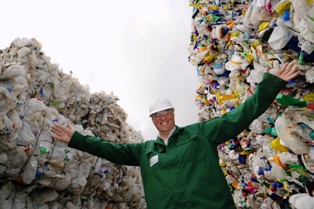
Queen's Award for Enterprise for plastics recycling pioneer
Redcar, Cleveland, 21st April 2009 – 'Typical British ingenuity and application' that enabled a modest red brick Teesside factory to lead the world in producing food-grade recycled plastic has been rewarded with a rare Royal honour.
Greenstar WES Ltd today (21st April 2009) received a Queen's Award for Enterprise in the Innovation category for its work in processing waste plastics into hygienic recycled material now found in millions of food trays and milk bottles across the country.
Based at the Wilton Industrial Park near Redcar, Greenstar WES (www.thewesgroup.co.uk) was first in the world to commercially produce food-grade HDPE plastic, known as r-HDPE, by developing a process that was unique at the time, less costly, and which is only now being followed by others in the industry.
Commenting on the honour, Greenstar WES founder and managing director James Donaldson said: "The Queen's Award is a tribute to typical British ingenuity and application, and I and all my staff feel very privileged to have our hard work rewarded in this manner. We've sacrificed a lot to bring our dreams to fruition, and I'd like to thank all my staff for their dedication. Thanks too should go to our suppliers, partners and customers who share our vision for turning waste plastic into a valuable reusable resource."
The formal presentation of the Queen's Award (www.queensawards.org.uk) by Her Majesty's Lord-Lieutenant for the region is likely to be arranged during the summer.
Thousands of tonnes processed
Majority-owned by fast-growing recycling business Greenstar UK (www.greenstar.co.uk), Greenstar WES receives up to 2,000 tonnes of baled plastics each month, much of it from domestic collections processed at Greenstar's materials recycling facilities such as its state-of-the-art site at Aldridge, near Birmingham.
Greenstar WES's r-HDPE output is supplied to British, Belgian, Italian, French and Dutch manufacturers, with around 60% of output contracted to major UK plastic milk bottle manufacturer Nampak (which supplies bottles for M&S's milk). The remainder goes for remanufacture into other food products, like chicken and mushroom trays, and cosmetics containers. Eventually Nampak will take around 6,000 tonnes annually of Greenstar's WES's r-HDPE, using it for making plastic milk bottles with up to 30% recycled content.
One 25 tonne load of r-HDPE flake, used in a 10% mix with virgin materials, can produce bottles for around £1 million-worth of bottled milk - and quadruple that value for chicken trays. Further development will enable greater use of recycled HDPE 'in the mix'.
Greenstar WES's current annual processing capacity of around 25,000 tonnes of plastics will save an estimated 37,000 tonnes of carbon emissions, as well as helping reduce the use of fossil fuels and virgin materials.
Crisp Success
Greenstar WES's innovation trail began in 2001 when it was first in the UK to implement a uniquely adapted recycling extruder. This enabled it to become the-then first and only UK processor capable of recycling metalised crisp packets, turning them into multi-coloured plastic pellets for making paint trays, plants pots etc. Greenstar WES still has an exclusive contract to process crisp packets, and handles around 2,000 tonnes annually.
In 2005, Greenstar WES began working with other companies using heavy print film for chocolate and sweet wrappers, and multi-layer films for rice and ethnic foods. In December that year, Greenstar WES installed, as a UK first, a specially adapted 3rd generation recycling extruder which was then the largest, most expensive and complex machine of its kind in the UK.
Greenstar WES was the only UK processor operating this way for some time, and even now, there is only one other machine of this kind in the country, installed in late 2008. Each year, Greenstar WES processes around 8,000 tonnes of heavily printed plastic film, a material often regarded as unprocessable, into pellets that are used to make injection moulded products such as trays and drainage channels.
Greenstar WES also uses the same process to convert around 4,000 tonnes annually of other waste plastics sourced from car scrap, specialist pipes and films. This ability to process around 12,000 tonnes pa of 'awkward' plastics makes Greenstar WES the UK market leader.
Further Innovation Investment
In April 2007, shortly before NTR-owned Greenstar UK bought 75% of WES to support its strategy of being the premier recycling-led waste management business in the UK, Greenstar WES was again first to invest in advanced machinery that combined standard granulation technology with a dry cleaner and a special recycling centrifuge (the latter is still unique in the UK).
This unique combination of technologies enabled the recycling of very low grade plastics such as dirty polystyrene, polypropylene items such as flower pots and drinks crates, and HDPE contaminated with nylon and PET. It lets Greenstar WES clean, wash, separate and dry mixed plastics with a fully automated process that uses less energy and requires a much smaller footprint (10% of the usual).
Around this time, HDPE containers such as milk bottles were becoming a hot recycling topic, and Greenstar WES found a way to use its technology for processing HDPE. This demanded substantial investment to assure output quality, as well as building an advanced food grade testing laboratory. Minimal chemicals are used in the wash plant, the process consumes less energy and occupies just one fifth of the traditional floor space, and only requires a single operator.
Looking to the future, Greenstar WES plans to develop its technology further for full commercial processing of around 30,000 tonnes annually of mixed domestic plastics and car shredder plastic scrap. This will put the company in the top three specialist plastics processors in the UK.
Back behind Greenstar WES's red brick walls on the Wilton Industrial Park, James Donaldson and his staff of 70 maintain their single-minded focus. "We're always playing with plastic and soon hope to have some new products to trial," he said. "Plastic is fantastic, especially when it's recycled."